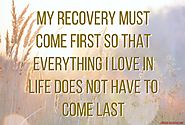-
About
- About Listly
- Community & Support
- Howto
- Chrome Extension
- Bookmarklet
- WordPress Plugin
- Listly Premium
- Privacy
- Terms
- DMCA Copyright
- © 2010-2025 Boomy Labs


 Drug Rehabs San Diego
Drug Rehabs San Diego
Listly by Drug Rehabs San Diego
Drug rehabs provide residential, inpatient, intensive outpatient and outpatient addiction treatment centers care. This combined with drug and alcohol detox centers they have the tools for people to achive long-term recovery.

In the alcohol detox San Diegotreatment phase, it is impossible for a patient not to experience some negative effects even when the detox is medically-assisted. The medications only limit the side effects to some levels but some side effects are unavoidable. A patient will experience the side effects in two phases:
Phase 1: Acute Alcohol Detoxification Withdrawal Phase
Phase 1 begins within hours after an alcoholic stops consuming alcohol. It goes on for days or weeks. In phase 1, a patient experiences the most severe side effects which are mainly physical. A patient experiences these symptoms because the body has relied on alcohol over the course of months or years of drinking.
Since alcohol is a depressant, the brain eventually stops producing certain chemicals that it receives from alcohol causing alcohol dependence. The withdrawal phase is a period when the body is taking time to adjust thus causing such experiences. The side effects include:
• Convulsions
• Whole body tremor
• Nausea
• Vomiting
• Insomnia
• Profuse sweating
• Shakiness
• Hypertension
• Heart failure
A patient can also experience some psychological breaks like anxiety and visual and auditory hallucinations.

The experience of alcohol detox is also determined by the type of program a patient chooses. Many centers spend a lot of time getting educated at addiction conferences to provide the best quality of behavioral health care. The two main options that a patient has to choose from are the:
a. Inpatient programs: here the patient is provided with round the clock care to help through the withdrawal symptoms. The patient lives at the hospital, detox clinic or rehab center during the detox process. It is usually more expensive because it offers more services
b. Intensive outpatient drug rehabs San Diego: Here the patient gets treatment during the day but lives at home. The patient only visits the detox clinic for medication to help with the withdrawal symptoms. It is relatively cheaper compared to inpatient rehab. It is safer and more effective for people with mild or moderate alcohol withdrawal.
Factors that Influence the Experience at Drug Rehabs
While the alcohol detox program is not pleasant, there are things that a patient can do to help them have a different experience which they would not otherwise have had even they lacked them. Some factors that a patient should consider are:
• The needs that they have for example medical or mental health conditions
• Availability of a support network will determine whether a patient goes for the residential or outpatient program
• The quality of treatment they are receiving from the detox program
• The qualification and licensing of the staff at the detox program
• Provision of aftercare to help them seek further treatment after the detox phase

Opiate Detox San Deigo and US Drug Rehabs Options
Opiate detox addiction treatment options are much needed across the US. Opiates include a number of prescription drugs like codeine, Dilaudid, and tramadol. Usually, people are opiates are often prescribed to people with pain but individuals who take these drugs in larger doses or for longer periods than initially prescribed have a high risk of becoming dependent. Opioid dependence makes a person feel that they need to continue using the drugs in order to function normally.
Today, painkillers and heroin are tied together. Over perscribed perscription medications is the leading cause of the heroin epidemic. This is why individuals need to how to quit heroin. As a matter of fact, many of the overdose deaths reported in the State of California and in the U.S. are due to prescribed drugs. This is mainly because painkillers are legal and a person can easily get them from a pharmacy, drug store or as over the counter drugs. People are now using opioids as a substitute for illegal drugs since they can easily acquire them. when they can't get the perscribed drugs is when they start using heroin.

At Harmony Grove Recovery drug rehabs San Diego we see opiate withdrawal symptoms that a patient experiences during the detox phase can be mild or severe. When individuals are seeking detoxification they must be careful in selecting a rehabilitation center. It doesn’t matter if you are attending drug rehabs in Florida or San Diego an opiate detox symptoms never change.
The symptoms are more severe in patients suffering from extensive drug abuse or addiction that is people who have consumed large doses of a substance over a significant period of time. The experience is further determined by:
An addict will start experiencing withdrawal symptoms within 24 hours after the last dose. These symptoms are like:
• Agitation
• Anxiety
• Muscle spasms
• Insomnia
• Runny nose
• Sweating
• Abdominal cramps
• Stomach aches
• Diarrhea
• Constricted pupils
• Fluctuating blood pressure
• Nausea
• Tremors
• Vomiting
When individuals are seeking "drug rehabs San Diego near me" they are trying to alleviate the above symptoms. This is extremely difficult without proper medical attention.

*How Long Does Detoxification Last? Recommended by many drug rehabs in San Diego *
a. The anticipatory heroin and opioid withdrawal stage
This occurs within 3 to 4 hours after the last dose. It is marked by increased anxiety or fear related to oncoming symptoms of withdrawal. The anticipatory stage is also characterized by cravings and drug-seeking behavior
b. The early acute stages of opiate withdrawal described by opiate detox New Jersey
It occurs within 8 to 10 hours of the last dose. A patient experiences an increase in anxiety and restlessness. They may also experience flu-like symptoms such as nausea, vomiting, sweating and stomach aches. In addition, cravings and drug-seeking behaviors continue to persist.
c. Full developed acute
It occurs 1 to 3 days after the last dose. At this stage, the withdrawal symptoms have reached their peak. A patient will experience body tremors, muscle spasms, diarrhea, insomnia and increased blood pressure. It is also in this period that a patient will experience the most intense cravings.
Post-Acute Opiate Withdrawal PAWS Symptoms Can be Helped by Opioid detoxification in New Jersey
It occurs up to 24 months after the last dose. The acute symptoms are no longer present at this stage but the patient experiences mood swings, cravings, drug dreams, anxiety, depression, irritability, insomnia, and poor concentration. The patient is also susceptible to any environmental triggers that may encourage them to relapse.
The opiate drug detox is just the first step to recovery because a patient can easily slip up from a trigger and go back to using. Painkillers can be highly addictive. Therefore, doctors recommend that a patient goes for further treatment like inpatient rehabilitation where they may receive more treatment in the form of therapy and counseling.

IOP Intensive outpatient Drug Rehabs San Diego Recommendations
When a person decides to get help from an addiction, they are different rehab programs that they can choose from. Some of these programs are like:
• Inpatient rehab programs: this is where the patient is admitted to a rehab facility during the period of recovery and they are monitored 24 hours a day
• Intensive outpatient drug rehabs San Diego: in these programs, a patient has scheduled visits to a rehab facility for several days a week where they receive treatment and go back home afterward. The visits are more frequent in the first months of addiction treatment and begin to reduce according to the doctor’s recommendations
• Gender-based addiction treatment programs: these are programs designed for a specific gender so as to create a space where women or men can help each other recover since they face almost the same challenges
• Teen-based rehabilitation programs: these are programs designed for teenagers who are struggling with drug abuse. Since teenagers have different needs as adult addicts, the rehab programs are structured in a way to cater to these needs
• Holistic-based drug programs: these are programs that incorporate other programs beside addiction treatments. The programs are like yoga, meditation and other programs that are target holistic recovery.
• Drug rehabs San Diego addiction treatment programs: these are programs that cater to the needs of addicts who are suffering from other recurring conditions beside an addiction. For example, a patient could be suffering from schizophrenia as well as drug addiction. Such a patient needs treatment for both the schizophrenia and the addiction and therefore they would not fit in other types of treatment.
• Other options that tie in include sober homes West Palm Beach, New Jersey, and California. Residential living facilities play a huge role in long-term recovery. By this stage, individuals should be well on their way to long term recovery. They should reinforce everything you’ve learned in opiate and alcohol detox and in the intensive outpatient treatment program.
• Public rehab programs: dual diagnosis drug rehabs San Diego addiction treatment programs are tied into many public programs and Universities to lower costs. This partnership assists many in getting better quality medical care.

Best drug rehabs Port St Lucie is a full service drug and alcohol addiction treatment center. We provide alcohol detox Port St Lucie and residential inpatient drug rehabs in Port St Lucie, Florida. Mental health with drug and alcohol addiction treatment call now for a consultation.

Alcohol detox centers in San Diego or anywhere in the US is the first step to recovery. It is impossible to recover from alcoholism without first doing through the detox process. This is one of the hardest for treatment centers to educate on with their drug rehab marketing and strategy. Detoxification gives an addict a fighting chance when it comes time to go for behavioral therapy and the other steps in treatment. However, a patient cannot rely solely on a detox to recover from alcohol addiction.
Besides setting the stage for the other steps of recovery, an alcohol detox gets a patient’s body in check. By definition, a detox helps the body to get rid of harmful substances and bring the body back on track. It helps to get rid of dependency.
Before an alcoholic can seek alcohol detoxification sometimes you need to know, how to perform an intervention on an alcoholic. During that process options for inpatient or outpatient addiction treatment centers can be determined. However, heavy users will need round the clock medical monitoring

Who needs an alcohol detox rehabilitation center?
Alcohol detoxification is the natural process where the body tries to rid the system of waste products and toxins that come about from excessive long-term alcohol consumption. Alcoholism brings on destructive patterns in everyday life, work and social situations. Alcoholics tend to have an impaired judgment which endangers relationships and increases the risk of physical harm.
People who need to detox from alcohol include:
i. People who develop alcohol tolerance. These are people who find that the same amount of alcohol has a diminished effect than previously and they need more alcohol to achieve the same results
ii. People with alcohol withdrawal symptoms. This is especially prevalent in heavy drinkers who may experience one or more withdrawal symptoms anywhere from several hours to few days after reducing intake. They experience anxiety, hand tremors, nausea, insomnia, rapid pulse, increased sweating and hallucinations
iii. People who drink alcohol to cover or avoid withdrawal
iv. People who drink more alcohol in a shorter period of time or prolonged alcohol use
v. People who try to quit alcohol without success
vi. People who need more time to recover from hangovers
vii. People who avoid certain social functions to hide their alcoholism or to indulge in heavy drinking without attracting notice
viii. People who continue to consume alcohol even when it is aggravating health issues they may be having like ulcers or depression

Many individuals are scared of the opiate withdrawal process. Opiate withdrawal symptoms can be extremely intense and uncomfortable. Drug rehabs have comfort medications that can reduce the withdrawal symptoms. An addict will start experiencing withdrawal once they suddenly stop using the drug or significantly reduce the amount they were taking. The withdrawal experience will depend on a number of factors including:
• The type of painkiller being abused
• The person’s established tolerance to the drug
• The length of addiction
• Whether they abused multiple substances
• The mental and medical history of the patient
The withdrawal symptoms that a patient experiences are not life-threatening. They are flu-like such as fever, sweating and vomiting. However, the symptoms can still cause tremendous physical and psychological distress to the person suffering.
The symptoms as so intense that people trying to end the drug use on their own may resort to using again to avoid the withdrawal process. Unfortunately, the cycle of stopping and resuming makes it much more difficult to quit later on because it can spiral into uncontrollable abuse patterns. The withdrawal experience can be lessened by opiate detox San Diego associated with addiction treatment centers if they have a qualified addiction Doctor.

The routine at an intensive outpatient program every day is made of times of group therapy, individual therapy, and skills development sessions. Well, the first day is time for the patient to get acquainted with the program, the staff, and the environment. By day two, a patient is accustomed and thrown into the scheduled program. So there are times for group therapy, individual therapy, and sessions for developing their skills.
90 Days Harmony Grove Recovery Drug Rehabs San Diego
Group therapy is actually the core of most intensive outpatient programs. This is because studies have shown that group participation is as effective as individual therapy. Participating in a group session supports an individual in a number of ways like:
• Patients have the chance to enhance their communication skills and a new resource for socialization. Such socialization is important especially for recovering addicts because their previous socialization was often with those who use drugs or alcohol.
• The patient has access to an environment where people in similar situations provide support, comfort and honest feedback
• Participation in group therapy reinforces healthful ways of interacting and provides a safe space that is vital to recovery efforts
• Patients who are farther along in recovery can provide valuable assistance and empathy to those who are early in the recovery process
• Group therapy provides a forum for therapists and group leaders to pass on important information and teach new skills and guide patients
• Groups provide an environment to witness more positive behavior associated with the recovery and to practice new modes of dealing with addiction
There are different types of group sessions which a patient can participate in so as to address a range of treatments and skills required for a successful recovery from addiction. The variety of different groups that IOPs are made up of are:
Skills-development Groups for Substance Abuse Treatment. These are designed to help clients practice specific behaviors in a safe setting.
a. Psycho-educational groups
These groups provide emotional support and the opportunity for a patient to learn about addiction, dependence and the consequences of abuse. In addition, the groups focus on developing problem-solving skills and techniques for altering ineffective belief systems
b. Refusal training groups
These groups allow patients to participate in role-playing exercises where they can rehearse how to effectively handle invitations to use the substance they trying to break free from
c. Relapse prevention groups
These are groups that help clients to identify triggers and high-risk situations and to develop techniques to avoid and manage them.
Family groups for Drug and Alcohol Addiction Treatment Centers
These groups focus on ways the patient and his or her family can support each other. In the groups, participants will also learn about the effects of addition on relationships and how best to deal with those challenges.
The experience will be different depending on how the group participation is conducted and how the groups are created but generally, collective participation underlies group therapy. Such an experience is important for a patient because they get to know that they are not alone in battling their addiction and that they can find help and comfort from others who are going through the same thing.
Individual Substance Abuse Addiction Treatment Therapy
Intensive outpatient programs will also give patients access to individual therapy. Individual therapy is important but not the main form of treatment in IOPs. During individual therapy, patients get to focus on the pressing problems that are caused by their addiction and their efforts to remain abstinent.
In addition, patients dig deeper into the work done in group therapy, spending more time on individual issues. Some patients may not be comfortable talking in a group setting. Individual therapy gives them the space to talk about more personal matters. IOPs usually schedule individual therapy sessions on a weekly basis especially early in treatment.
A patient gets to establish a close and honest relationship based on mutual trust and commitment to recovery with their therapist.
Complementary Therapies for Drug Rehabilitation
IOPs will also offer alternative therapies to complement their traditional offerings. For example, they may offer treatments like art therapy, music therapy, adventure therapy, and equine-assisted therapy. Such treatments allow patients to tap into nonverbal ways of healing. The sessions will be led by therapists who are trained in a particular area and take place in a group setting. Mostly, these sessions are scheduled for every other afternoon.
Mostly, these sessions are scheduled on every other afternoon Support groups Intensive outpatient programs recommend patients to participate in peer support groups. For the better substance abuse treatment centers with drug rehabs New Jersey options make sure they will include Support groups with their drug rehab marketing.
No wonder most IOPs host such meetings like Alcoholics Anonymous on their premises. This makes it easier for patients to attend when they are there for their treatment sessions.
Support Groups
Intensive outpatient programs recommend patients to participate in peer support groups. For the better substance abuse treatment centers they will include support groups with their drug rehab marketing. No wonder most IOPs host such meetings like Alcoholics Anonymous on their premises. This makes it easier for patients to attend when they are there for their treatment sessions.
The IOP experience is an all-round experience where patients not only receive personal care but also group care. It is an experience of building new friendships and establishing support systems that will go a long way to help them.

California drug rehabs Los Angeles need help with patient brokering laws. inpatient, IOP and alcohol detox centers in LA need ethical drug rehab marketing and

_IOP Drug Rehabs Los Angeles near me _| Alcohol Detox Los Angeles | Inpatient Drug rehabs Los Angeles | LA | 3 followers on LinkedIn. Drug rehabs Los Angeles and alcohol detox centers in LA with inpatient addiction treatment centers for substance abuse. | 𝘿𝙧𝙪𝙜 𝙧𝙚𝙝𝙖𝙗𝙨 𝙇𝙤𝙨 𝘼𝙣𝙜𝙚𝙡𝙚𝙨 is an intensive outpatient addiction treatment center. Drug rehabs Los Angeles for opiate detox,
Drug and alcohol addiction treatment centers in Battle Creek Michigan. We provide holistic wellness and maintain the best quality of life possible at our drug rehabs in Michigan. We are one of the best inpatient drug rehabs Battle Creek, Michigan offers.

Drug rehabs West Palm Beach near me - A collection of articles of what it is like to attend a drug rehab in South florida. LEarn about inpatient, intensive outpatient substance abuse treatments.

Drug rehabs West Palm Beach residential inpatient, intensive outpatient, opiate and alcohol detox centers in West Palm Beach, Florida. Alcohol addiction treatment centers providing Joint commission accredation care. This list is the best drug and alcohol addiction treatment centers in West Palm Beach Florida. Included in this list is SAMSHA which is a governmen...

Best alcohol detox centers in San Diego provides the best information on addiction treatment centers. LEarn about drug detox, residential, inpatient, and intensive outpatient medical care.

Drug Rehabs San Diego Californai near me educating on California's alcohol detox centers and IOP outpatient centers near me. Accept most health insurances. We help La Jolla and Escondido California reas.

Alcohol Detox San Diego? Visit Harmony Grove Recovery. We treat alcohol and drug rehabilitation, mental health problems, and EMDR therapy. We can offer you help!

This list is the best drug and alcohol addiction treatment centers in West Palm Beach Florida. Included in this list is SAMSHA which is a governmen...

How to know when to attend inpatient drug rehabs San Diego or any addiction treatment center. Addiction is a complex and often…

Our inpatient drug rehabs San Diego explains why they are the best drug and alcohol addiction treatment center in California. Addiction is…

HGR inpatient drug rehabs San Diego answers, "Why is it important to have a solid after care plan in place?" Staying sober while still in a program can be a challenging task due to multiple reasons. Firstly, the physical cravings for the substance can be potent, causing discomfort and a strong desir

The best drug rehabs San Diego options is a collection of substance abuse rehabilitation centers in southern California. These administer…

What to Look for When Seeking Drug Rehabs San Diego, California Options? Finding the best drug rehabs San Diego can be a frustrating task. There are different options from inpatient addiction treatment centers to opiate and alcohol detox centers in California.
